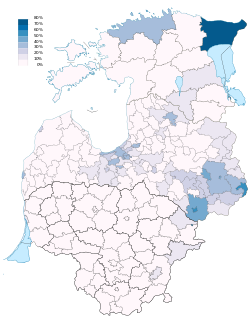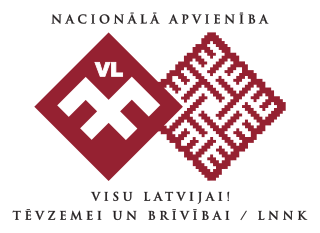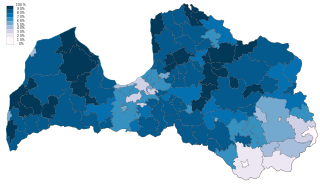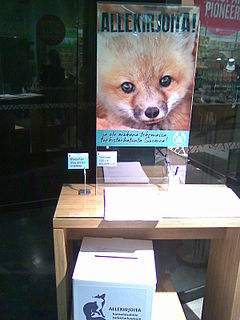
This article is about the demographic features of the population of the historical territory of Latvia, including population density, ethnic background, education level, health of the populace, economic status, religious affiliations and other aspects of the population.

The politics of Latvia takes place in a framework of a parliamentary representative democratic republic, whereby the Prime Minister is the head of government, and of a multi-party system. The President holds a primarily ceremonial role as Head of State. Executive power is exercised by the government. Legislative power is vested in both the government and parliament, the Saeima. The Judiciary is independent of the executive and the legislature. The Economist Intelligence Unit has rated Latvia as "flawed democracy" in 2017.

The Latvian Russian Union (LKS) is an ethnic minority, left-wing political party in Latvia, supported mainly by ethnic Russians and other Russian-speaking minorities. The co-chairpersons of the Latvian Russian Union are Miroslav Mitrofanov, Yuriy Petropavlovsky and Tatjana Ždanoka.

The Constitution of Latvia, ratified on February 15, 1922, contains a provision regarding one of the reserve powers of the President of Latvia to initiate the dissolution of the parliament. According to Article 48-50 of the Constitution,

Russians in the Baltic states describes self-identifying ethnic Russians and other primary Russian-speaking communities in Estonia, Latvia, and Lithuania, commonly referred to collectively as the Baltic states. In 2017, there were 0.9 million ethnic Russians in the Baltic States, having declined from 1.7 million in 1989, the year of the last census during the Soviet era.
Latvia does not recognize same-sex unions, either in the form of partnership or marriage. The Latvian Constitution prohibits the recognition of same-sex marriages.
Delfi is a major internet portal in Estonia, Latvia, and Lithuania providing daily news, ranging from gardening to politics. It ranks as one of the most popular websites among Baltic users.

Lesbian, gay, bisexual, and transgender (LGBT) people in Latvia face legal and social challenges not experienced by non-LGBT residents. Both male and female same-sex sexual activity are legal in Latvia, but households headed by same-sex couples are not eligible for the same legal protections available to opposite-sex couples. Same-sex couples are unable to marry or adopt. Latvia does not recognize same-sex marriage or any other type of partnership, including registered partnerships.

Valdis Zatlers is a Latvian politician and former physician who served as the seventh president of Latvia from 2007 to 2011. He won the Latvian presidential election of 31 May 2007. He became President of Latvia on 8 July 2007 and left office on 7 July 2011 after failing to win reelection for a second term.

Articles 4 and 114 of the Constitution of Latvia form the foundation for language policy in Latvia, declaring Latvian to be the official state language and affirming the rights of ethnic minorities to preserve and develop their languages. Livonian language is recognized as "the language of the indigenous (autochthon) population" in the Official Language Law, but Latgalian written language is protected as "a historic variant of the Latvian language." All other languages are considered foreign by the law on state languages. Latvia provides national minority education programmes in Russian, Polish, Hebrew, Ukrainian, Estonian, Lithuanian, and Belarussian.

A constitutional referendum to amend the constitution of Latvia in order to allow one-tenth of the total registered electorate to initiate a popular referendum to dissolve the Latvian parliament was held in Latvia on 2 August 2008.

Parliamentary elections were held in Latvia on 2 October 2010. It was the first parliamentary election to be held in Latvia since the beginning of the economic crisis during which Latvia had experienced one of the deepest recessions in the world.

Andris Bērziņš is a Latvian businessman and politician who was President of Latvia from 2011 to 2015. Bērziņš was the President of Unibanka from 1993 to 2004. He was elected as President by the Saeima on 2 June 2011.

The Reform Party, until April 2012 known as Zatlers' Reform Party, was a centre-right political party in Latvia founded by former President Valdis Zatlers on 23 July 2011. It won 22 seats in the Saeima in the 2011 election.

Early parliamentary elections were held in Latvia on 17 September 2011, following the country's first parliamentary dissolution referendum held on 23 July 2011. The previous parliamentary election was only held in October 2010.
For the Native language! was a political party in Latvia. The party's leader was Vladimir Linderman.

The Russian language in Latvia is the second most commonly used language at home and 26.9% of the population were ethnic Russians (2011).
Amendments to the Citizenship Law of Latvia, suggested by a popular initiative in 2012, sought to grant citizenship of Latvia, starting in 2014, to those non-citizens who would not refuse it. The proposed amendments were rejected by the Central Election Commission. The CEC decision was contested by the proponents of the amendments, who applied to court. The court proceedings were suspended in 2013, with the Supreme Court requesting the Constitutional Court to decide on the compliance of some applicable provisions with the Constitution.


















